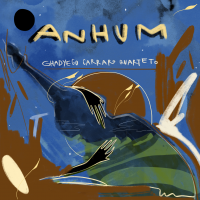
Rifftides reader Debra Kinzler's notice that a quartet of Clifford Jordan's admirers will revive his Glass Bead Games prompts me to post a slightly revised version of a 2007 piece about a landmark recording that became unavailable for too long. Ms. Kinzler informs us that tenor saxophonist Seamus Blake, pianist Eric Reed, drummer Billy Drummond and bassist Dezron Douglas will perform Jordan's work in an engagement May 17-22 at Dizzy's Club Coca-Cola in New York. She describes the 1974 album as “monumental," an adjective that passes the hyperbole test. Here's what we posted when it became known, after the LP had all but disappeared, that the music would finally make it to CD.
Debra Kinzler gets the final words—a biographical sketch of Jordan.
Glass Bead Games: A Reissue Event
Clifford Jordan, one of the great (term used advisedly) tenor saxophonists of the second half of the twentieth century, in 1974 made a magnificent album called Glass Bead Games. Billy Higgins was the drummer on all twelve tracks. Cedar Walton and Stanley Cowell shared piano duties. Sam Jones and Bill Lee were the bassists in the two editions of Jordan’s quartet represented on the album. Sonny Rollins, who rarely provides blurbs, called Glass Bead Games “Clifford Jordan at his best…with a great band!”
The album consisted entirely of Jordan compositions, a practice often adopted for the wrong reasons. Jordan followed it for the right ones; he was an accomplished and original composer, and he was inspired by Herman Hesse’s novel The Glass Bead Game. His music captures something of the mystery and strange energy of that story. The playing by all hands–but particularly by Jordan–is exceptional. Issued as a double LP on the Strata East label, the album finds Jordan maintaining his commitment to mainstream values while edging into the freedom of new music pioneered by colleagues like Eric Dolphy, Ornette Coleman and John Coltrane. He achieved a balance that might have served as an example for some of the space cadets who took the new music so far out that it became inaccessible to most listeners.
Glass Bead Games has not been generally available in its entirety for years. I have heard of copies of the LP set going at auction for as much as $100.00. From time to time, CDs of the album have been available from Japan at high prices. Now that she has acquired the rights to it, Jordan’s widow Sandra (he died in 1993) has made Glass Bead Games available at a reasonable price, apparently only from this source. Its reappearance is an important reissue event. I did an A/B comparison of the original LPs to the CD and was relieved to find that the sound quality has not been digitally distorted. (First posted October 9, 2007)
Debra Kinzler gets the final words—a biographical sketch of Jordan.
Clifford Jordan (1931-1993) was born in Chicago. He was a self- taught musician who claimed his biggest musical influence was Lester Young. He played his first professional gig with Max Roach, eventually leaving Chicago to replace Sonny Rollins in the Max Roach quintet. He later worked with Sony Stitt, Charles Mingus, Horace Silver, Art Blakey, Randy Weston and J.J. Johnson, among many others. His style of tenor sax playing was powerful and soulful and he was often thought to be the tenor saxophonist of his generation to carry on the torch of “Lester Young.” Clifford Jordan’s music was often misunderstood and undervalued, staying that way even at the time of his passing at the premature age of 61.



























